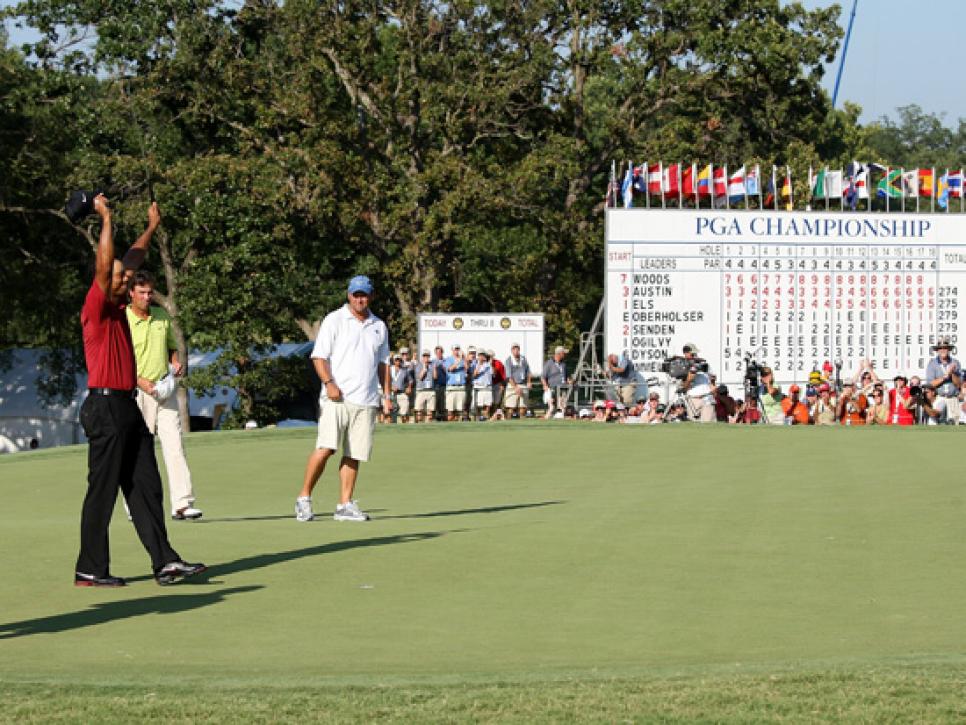News
Players Want To Win The PGA, But Not Necessarily Most Of All

Tiger Woods celebrates his victory at Southern Hills in 2007, Ogilvy's favorite PGA Championship to date.
It's a curious thing, but history doesn't differentiate when it comes to major victories. The total is what counts, not the details. So a five-time major winner with, say, three U.S. Opens and two Masters victories is the same as one with two Masters, two U.S. Opens and a British Open to his name. And two one-time winners are both still "major champions," no matter which of the four they happened to win.
On the other hand, the final major of every season is, in the minds of many, "last amongst equals." If you polled every professional golfer in the world, it's hard to imagine anyone claiming that he wants to win the PGA Championship most of all. Even guys whose only major victory came at a PGA aren't likely to say it.
The PGA suffers because the other three majors are so unique and special. That's not to say the PGA is not a great tournament, but it lacks the identifiable qualities owned by the other members of the Grand Slam, even if it is the world's premium "normal" tournament.
Think about it. The Masters is unique because it is always played on the same, very special course. And it was the legendary Bobby Jones' tournament. The U.S. Open is America's national championship, run by the USGA, one of the game's governing bodies, played on the great American courses. Pretty much every great American player -- except Sam Snead -- has won it. And the British Open is the oldest championship of them all, held annually on a links course while staged and organized by golf's other rules-making body, the R&A.
The PGA, like it or not, doesn't have quite the same cachet. Yes, it has been played on many of America's best courses, but too often it has not. And, while it has been won by most of the game's true legends, neither Tom Watson nor Arnold Palmer have their names on the Wanamaker Trophy.
None of which is to even remotely imply that the PGA Championship does not inspire in me the same feeling of anticipation I get at the other majors. Each April the Masters benefits from being the first major after seven long months. The PGA is the other side of that coin; every year it is the last chance to win a big one, so there is always a sense of desperation in those with an opportunity to win the title. Whatever else happens, a PGA victory would highlight a season to remember.
My favorite PGA Championship was held at Southern Hills in 2007, despite the temperatures rocketing into triple figures every day. That was the best course I've played in a PGA. The setup was great with a bit of width to the fairways. The rough was relatively insignificant. The greens were hard and fast. And, while hardly anyone broke par for four rounds, Tiger Woods, the best player in the world at the time, lipped out a putt on the last green in the second round that would have given him a 62.
It doesn't get any better than that. The best player, playing well, found the course relatively easy. But everyone else found it really difficult. Sometimes, when major championship courses get too hard, they don't allow the best players to show their best golf. Instead, they restrict everyone's ability to play well. That wasn't the case at Southern Hills. The best player could and did separate himself from the rest, but he had to be the best player to do that. If I'd been the course superintendent that week, I'd have been proud of the job I did. It was close to perfect.
Still, if the PGA of America is actively looking to create a unique aspect to the tournament, officials might consider returning to the match-play format abandoned in 1958. I know knockout golf doesn't readily lend itself to the modern-day commercial realities of television and ticket sales, but if the venue is set up in a way that allows the best players to perform well -- just as at Southern Hills -- I think you'd find, generally speaking, those guys will win most of their matches. The best players are going to win majors, no matter the system used to identify them.
Anyway, it's got to be worth thinking about, especially if the PGA of America is tired of being labeled "least important major," the one that lacks the inherent distinctiveness of the other three.